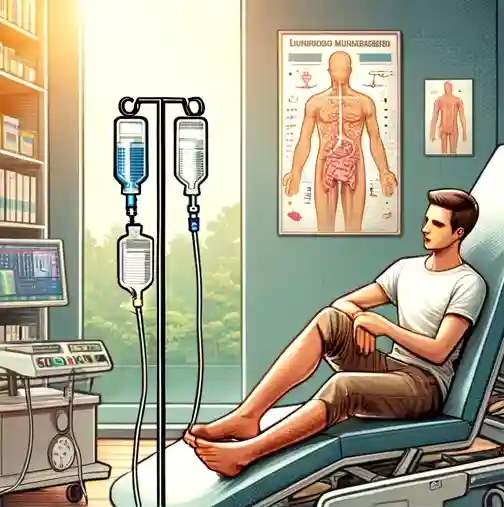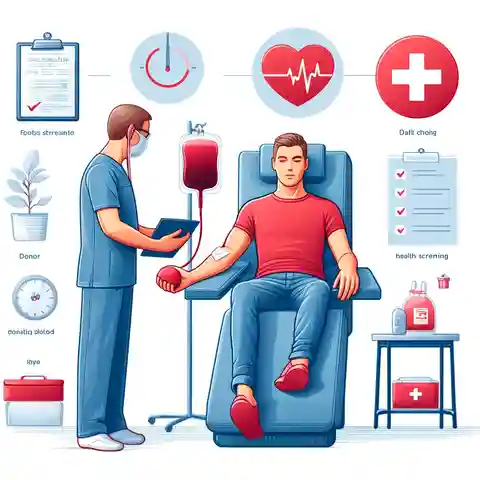Learn about potential side effects of infusion for Crohn’s disease. This guide covers common, serious, and long-term risks, plus tips for managing them.
Crohn’s disease can make you feel very sick. It can hurt your tummy a lot. Infusion therapy might help you feel better. This is when you get medicine through a tiny needle in your arm. It’s a strong medicine, but it can have side effects. Side effects of infusion for Crohn’s disease can make you feel tired or a little sick. Your doctor can help you feel better if this happens.
What is infusion therapy for Crohn’s disease?

Side effects of infusion for Crohn’s disease – Shows a male patient receiving infusion therapy in a calm and professional clinic environment
Infusion therapy involves the intravenous (IV) delivery of medications directly into the bloodstream. It’s used for moderate to severe Crohn’s disease when other treatments haven’t been effective or stop working.
These medications target the immune system to reduce inflammation and help achieve remission.
Side Effects of Infusion Therapy for Crohn’s Disease

Features a detailed scene where a male patient discusses potential effects of infusion for crohn’s disease with a male doctor in a consultation room.
Common Side Effects
Most people experience some mild side effects from infusion therapy. These can include:
- Feeling tired: You might want to rest afterward.
- Headache or nausea: These usually go away on their own.
- Pain or redness where you got the medicine: An ice pack can help.
- Flu-like symptoms: Think fever, chills, or body aches.
Infusion Reactions
While most people tolerate infusion therapy well, some individuals experience a reaction during the infusion itself. These reactions range from mild to more severe and can include:
- Fever and chills: You might feel hot or shivery.
- Trouble breathing: This could be shortness of breath, wheezing, or a tight feeling in your chest.
- Changes in blood pressure: Your blood pressure might go up or down, making you feel dizzy or lightheaded.
- Other symptoms: Nausea, headache, skin rash, or a general feeling of being unwell.
Why do infusion reactions happen?
Sometimes, your body’s immune system reacts to the infusion medication as if it were a foreign substance. This can trigger a variety of responses.
What to expect at your infusion
Close monitoring: Your doctor or nurse will watch you closely during your infusion, checking your vital signs (like blood pressure and heart rate) regularly.
Immediate action: If you start to have a reaction, they’ll take steps to help right away. This might involve:
- Slowing down or stopping the infusion.
- Giving you medication to treat symptoms, like fever reducers, antihistamines, or in severe cases, steroids.
- For very serious reactions, additional medical care might be needed.
Important:
- Tell your doctor or infusion nurse immediately if you start to feel unwell during your infusion. Don’t try to tough it out!
- Most infusion reactions are manageable and resolve after the infusion is paused and you receive the appropriate treatment.
Serious Risks
Infusion therapy can also have some rare but serious side effects. These are important to keep in mind:
- Infections: Infusion medications can make it harder for your body to fight infections. You might need to be extra careful about germs and get vaccinated.
- Liver problems: Your doctor will do blood tests to check your liver health.
- Rare cancers and other conditions: There’s a very small increased risk of certain cancers or nervous system problems.
Benefits of Infusion Therapy for Crohn’s Disease
Infusion therapy can have side effects, but it also has big benefits:
- Strong and Fast Help: Infusion medicines go straight into your blood for quick action.
- Feeling Better for Longer: These medicines can help you feel better for a long time (this is called remission).
- Keeps You Feeling Good: Once you’re in remission, regular infusions can help stop your Crohn’s from flaring up again.
- Fewer Pills to Take: With infusion therapy, you don’t have to take as many pills every day.
- Helping with Surgery: Sometimes, infusion therapy can help calm down really bad flare-ups.
Important to Remember: Infusion therapy isn’t perfect for everyone. Your doctor will help you decide if the good stuff is better than the possible side effects.
Managing Side Effects of Infusion for Crohn’s Disease

Side effects of infusion for Crohn’s disease – a male nurse administering infusion therapy to a male patient, highlighting the IV setup and medical equipment.
Most side effects from infusion therapy aren’t too bad and can be managed. Here’s how you and your doctor can work together to make you feel better:
Dealing with Mild Side Effects
- Talk to your doctor: They know the most about your treatment and can help you with specific side effects.
- Simple pain relievers: Ask your doctor if you can take over-the-counter medicine like ibuprofen or acetaminophen for headaches, fever, or achy muscles.
- Change your infusion time: Getting your infusion in the morning instead of the evening (or the other way around) might help if you feel tired afterward.
- Slower infusion: For some people, getting their medicine more slowly helps prevent reactions or feeling like you have the flu.
- Medicine beforehand: Sometimes, taking medicine like antihistamines or pain relievers before your infusion can stop some side effects from happening.
Worrisome or Bad Side Effects
- Don’t wait: Call your doctor right away if you have any side effects that are severe, strange, or getting worse. This includes things like bad stomach pain, fever that won’t go away, trouble breathing, or weird rashes.
- Get medical help fast: Some reactions might need quick treatment or changes to your therapy. Your doctor will know what to do.
Tips and Examples
Here are some additional tips and examples for managing specific infusion therapy side effects:
Fatigue
- Rest and recovery: Allow yourself time to rest before and after your infusions. Plan lower-key activities for infusion days.
- Hydration matters: Drinking plenty of fluids can help combat fatigue.
- Talk to your doctor: If fatigue is severe or interferes with your daily life, let your doctor know. They may want to check for other factors like anemia that could be contributing to tiredness.
Nausea
- Bland is best: Stick to bland foods before and after your infusion, such as toast, crackers, or rice.
- Small, frequent meals: Eating smaller meals throughout the day can be easier on your stomach than large ones.
- Ginger power: Sipping ginger tea or ginger ale can help settle nausea.
- Ask about anti-nausea medication: If nausea is a problem, your doctor might prescribe an anti-nausea medication to take before your infusion.
Headaches
- Over-the-counter relief: Ibuprofen or acetaminophen may help with headaches, but check with your doctor first.
- Stay hydrated: Dehydration can worsen headaches.
- Cool compress: Applying a cool compress to your forehead or the back of your neck might provide relief.
Injection Site Reactions
- Ice it: Applying an ice pack (wrapped in a towel) to the injection site can reduce swelling and redness.
- Topical relief: Over-the-counter hydrocortisone cream can help soothe itching or mild rashes.
- Tell your nurse: Let your infusion nurse know if you experience pain, swelling, or a rash around the injection site.
Important Note: Always consult your doctor before using any over-the-counter medications or remedies, especially while on infusion therapy, to make sure they won’t interact with your treatment.
Different Medications, Different Risks
Not everyone has the same side effects from infusion therapy. The specific medication you take plays a big role in the types of side effects you might experience. Here’s a quick overview of some common infusion medications for Crohn’s disease:
Anti-TNF Biologics (like Remicade, Humira, Cimzia)
These medications are very effective but can increase your risk of infections. Some people also experience infusion reactions, skin reactions, or joint pain.
Integrin Receptor Antagonists (like Entyvio)
These are generally well-tolerated, but some people may have headaches or infections. A very rare but serious risk with this type of medication is a brain infection called PML.
Interleukin Inhibitors (like Stelara)
Potential side effects include infections, injection-site reactions, and fatigue.
This is just a brief overview. There can even be slight variations in side effects between medications within the same class.
Precautions Before Starting Infusion for Crohn’s Disease

Side effects of infusion for Crohn’s disease – a male nurse administering infusion therapy to a male patient, highlighting the IV setup and medical equipment.
Before starting infusion therapy, there are some key things to do:
- Get vaccinated: It’s safer to be up-to-date on vaccines before your immune system is affected by the medication.
- Talk about your other medications: Let your doctor know about everything you take, including supplements, to avoid bad interactions.
- Discuss pregnancy and breastfeeding: Some infusion medications aren’t safe if you’re pregnant or breastfeeding.
FAQs About Infusion Therapy for Crohn’s Disease
- How often will I need infusion therapy? The frequency of infusions depends on the medication you’re taking and how well the treatment works for you. Some people start with more frequent infusions, then space them out over time.
- Will I need infusion therapy forever? Your doctor will work with you to figure out the best long-term treatment plan. Some people can stop infusion therapy after a while, while others continue it for many years.
- Can I get infusions at home? While most infusions are done in a doctor’s office or infusion center, some medications can be given at home by a trained nurse. Ask your doctor if this is an option for you.
- What can I do to minimize my risk of side effects? Staying hydrated, getting enough rest, and talking to your doctor about managing any pre-existing health conditions can help reduce some side effects.
- Is there anything I should avoid while on infusion therapy? It’s usually recommended to avoid live vaccines while on infusion medications. Your doctor will give you specific instructions about any other activities or substances to avoid.
The Bottom Line
Thinking about infusion therapy for Crohn’s disease? Talk to your doctor about the possible side effects of infusion therapy for Crohn’s disease. They can help you figure out if this treatment is a good fit for you.


